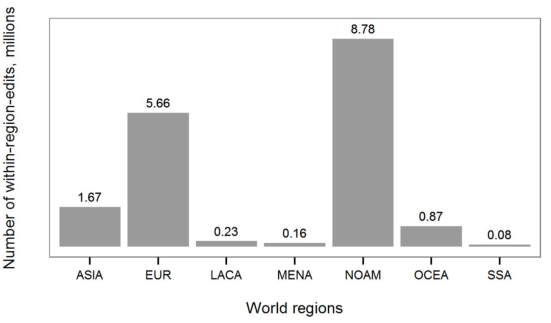12 Dec 2014
An earlier post showed how different parts of the world have very different levels of engagement with local content in Wikipedia. The data presented there showed that a majority of content about North America and Europe are created in those regions, whilst only a small minority of content about Latin America, the Middle East and North Africa (MENA), and Sub-Saharan Africa is created locally.
But there was an interesting difference between MENA and Sub-Saharan Africa. A minority of edits coming from MENA are actually about local content (in other words, despite the relative lack of content about the region, and especially the lack of local content about the region, most edits from the region are actually about other parts of the world). This isn’t the case in Sub-Saharan Africa though. As our work has demonstrated, there is certainly a paucity of content (and locally-produced content) about the region, but Wikipedia editors in the region produce almost the same proportion of local content as their counterparts in North America or Europe.
Why then, does Sub-Saharan Africa have such a low overall percentage of locally contributed content? The answer is a simple one.
The graph above shows the absolute number of within-region-edits (both anonymous and registered) to geolocated articles in the English-language Wikipedia, by world region. In terms of raw numbers, North America and Europe drastically outnumber the remaining world regions. Conversely, Latin America, MENA, and Sub-Saharan Africa all commit only a very small number of within-region-edits. What this means is that even a relatively small number of edits flowing into those regions from outside (i.e. allochthonous contributions) could easily drown out local voice from places like Sub-Saharan Africa: something we undoubtedly see happening.
Note that this work comes from the following report (the relevant parts of which were written with the help of Ralph Straumann and Bernie Hogan):
Graham, M., and Hogan, B. 2014. Uneven Openness: Barriers to MENA Representation on Wikipedia. Oxford Internet Institute Report, Oxford UK.
The following paper also offers an abridged version of some of the results:
Graham, M., Hogan, B., Straumann, R. K., and Medhat, A. 2014 Uneven Geographies of User-Generated Information: Patterns of Increasing Informational Poverty Annals of the Association of American Geographers (forthcoming).
Or for a broader discussion about why the locality of participation matters, see:
Graham, M. 2014. Internet Geographies: Data Shadows and Digital Divisions of Labour. In Society and the Internet: How Networks of Information and Communication are Changing our Lives, eds M. Graham and W. H. Dutton. Oxford: Oxford University Press. 99-116.
Graham, M., M. Zook, and A. Boulton. 2013. Augmented Reality in the Urban Environment. Transactions of the Institute of British Geographers. 38(3) 464-479.
